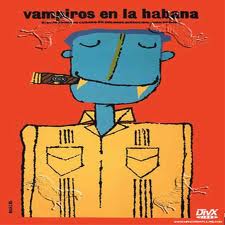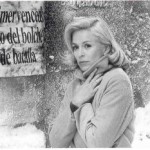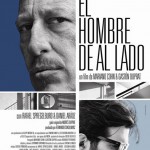Blog del Instituto Cervantes de Dublín
Torre Martello
Cine | Film Screening: Lo mejor de mí
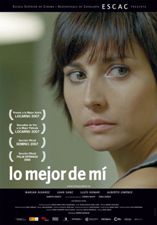 Continuamos con el ciclo de nuevos realizadores españoles. La proyección de hoy es Lo mejor de mí, de la directora Roser Aguilar, una fresca y sensible historia que puedes disfrutar hoy a las seis en nuestro Café Literario.
Continuamos con el ciclo de nuevos realizadores españoles. La proyección de hoy es Lo mejor de mí, de la directora Roser Aguilar, una fresca y sensible historia que puedes disfrutar hoy a las seis en nuestro Café Literario.
Cuando era pequeña, Raquel no podía entender por qué en todas partes se hablaba de amor: en la radio de casa, en la tele, en las películas del sábado por la tarde y, sobre todo, en las canciones. Y pensaba qué pasaría si no encontraba a nadie que la quisiera. Ahora Raquel se va a vivir con Tomás. Deberá plantearse qué está dispuesta a hacer por amor y descubrirá lo bonito y difícil de querer a alguien de verdad.
We keep offering you the best of new Spanish film makers. The film Lo mejor de mí, a fresh and sensitive story by Roser Aguilar will be screened today at 6pm at Café Literario.
When Raquel was a little girl she could not understand why everyone talked constantly about love: on the radio, on TV, in Saturday afternoon films and specially in songs. She always wondered what would happen if she did not find anyone who would love her. When Raquel moves in with Tomas, she will have to ask herself what she could be willing to do for love. She will discover how beautiful, and at the same how difficult, it is to truly love someone.
Cine | Film Screening: El vuelo del tren
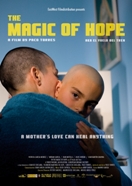 Comenzamos un nuevo ciclo de cine dedicado a los nuevos directores de nuestro cine. La película de hoy es El vuelo del tren que se proyectará a las 18:00 en el Café Literario. Para esta primera sesión contaremos con la presencia de su director, el realizador español afincado en Dublín Paco Torres y la cantante irlandesa Eleanor McEvoy, autora de dos temas de la película.
Comenzamos un nuevo ciclo de cine dedicado a los nuevos directores de nuestro cine. La película de hoy es El vuelo del tren que se proyectará a las 18:00 en el Café Literario. Para esta primera sesión contaremos con la presencia de su director, el realizador español afincado en Dublín Paco Torres y la cantante irlandesa Eleanor McEvoy, autora de dos temas de la película.
Blanca, es una madre soltera y luchadora que se enfrenta en el mejor momento de su vida a la posible pérdida de Aran, su única hija, cuando ésta le diagnostican leucemia. El dolor por la posible pérdida de su hija le hace sentir la verdadera dimensión del ser humano en un dramático realismo mágico que la llevará a despertar a la vida. Unas semanas en una gran cuidad. Una casa. Un hospital. Una familia, madre e hija. Un universo de magia, donde el amor y la perseverancia llevan a nuestros personajes a descubrir la esperanza a partir del sufrimiento y el dolor. Al final descubrimos que podemos aprender de otros siempre y cuando uno quiera.
Película seleccionada por la European Film Promotion in 2012 junto a Blancanieves y nominada a cuatro premios Asecan en 2012, así como la selección oficial de festivales como Galway Film Fleadh, PIFF y Festival de Cine Europeo de Sevilla.
Antes de la película se proyectará el último trabajo del director, el cortometraje Halowin(6 min.)
Today we start a new film series dedicated to Spanish new film directors. The first screening will be today at 6pm at Café Literario. The film is El vuelo del tren and its director, Paco Torres, and the Irish singer Eleanor McEvoy, author of two songs of the soundtrack, will attend this opening night to present the movie.
At the best moment in her life Blanca, a single mother and fighter has to face the possible loss of her only daughter, Aran when she is diagnosed with leukemia. The pain of possibly losing her daughter makes her realize the true dimension of human beings in a dramatic, magic realism which will bring her to open up to life. A few weeks in a big city. A house. A hospital. A family, mother and daughter. A magical world, where love and perseverance lead our characters to the discovery of hope through suffering and pain. Finally we realize we can learn from other people as long as we want to.
Selected by the European Film Promotion in 2012 with Blancanieves and nominated to four ASECAN Awards in 2012 and by the Galway Film Fleadh, PIFF (Pune International Film Festival) and the Seville European Film Festival.
The film will be preceded by the screening of Paco Torres’ last work, the short film Halowin(6 min).
Cine | Film screening: Vampiros en la Habana
Nos despedimos del ciclo de cine cubano con la película de animación Vampiros en la Habana. La película empieza a las 18:00 en el Café Literario. ¡Estáis todos invitados!
La divertida trama transcurre en 1933 y grupos dominantes de vampiros europeos y norteamericanos se dan cita en La Habana para hacerse con la fórmula de la mágica poción “Vampisol”, desarrollada por el científico alemán Werner Amadeus von Dracula, que permite a los vampiros exponerse al sol, sin ser afectados por los rayos ultravioleta.
La prueba viviente de la efectividad de la poción, Wolfgang Amadeus von Dracula, Pepito para sus amigos, es un divertido trompetista, que ha sido criado tan normalmente que desconoce por completo su origen vampiresco.
The last session of the Cuban film series will be today at 6pm at Cafe Literario where you can enjoy the animated film Vampiros en la Habana. All of you are invited!
The hilarious story is set in 1933. Dominant European and American vampire groups meet in Havana to get their hands on a fabulous new potion called “Vampisol”, developed by German scientist Werner Amadeus von Dracula, that lets vampires out into the sun without the harmful effects of UV rays.
Living proof of the successful potion is Wolfgang Amadeus von Dracula, Pepito to his friends, a carefree trumpet player, raised so normally that he has no idea he is a vampire.
Cine | Film screening: Viva Cuba
Si todavía no has podido disfrutar del ciclo de cine cubano, no te preocupes porque hoy tienes una nueva oportunidad.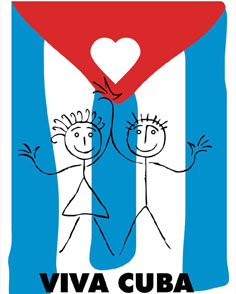 Hoy puedes asistir a la proyección de Viva Cuba a las 18:00 en el Café Literario.
Hoy puedes asistir a la proyección de Viva Cuba a las 18:00 en el Café Literario.
Malú y Jorgito son dos niños que se han prometido amistad para toda la vida, a pesar de que sus familias se detestan. Cuando la abuela de Malú se muere y su mamá decide irse a vivir fuera de Cuba, Malú y Jorgito tendrán que escaparse hasta el fin del mundo en busca de una esperanza para su amor.
Aunque es una historia de amor entre niños, la película ha sido catalogada para todas las edades.
If you still haven´t been able to enjoy the Cuban film series, don´t worry because you have a new chance today with the screening of Viva Cuba today at 6pm at Café Literario.
Malú and Jorgito are two children who have promised to be friends forever, despite their families hating each other. When Malú’s grandmother dies and her mother decides to live abroad, Malú and Jorgito will have to run to the end of the world, looking for hope for their love.
Though it is a children’s love story, the film has been tagged for all ages.
Cine | Film screening: Kangamba
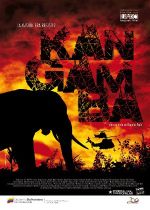 La tercera sesión del ciclo de cine cubano llega de la mano de la película Kangamba. ¡Ven a disfrutarla hoy a las 18:00 horas en el Café Literario!
La tercera sesión del ciclo de cine cubano llega de la mano de la película Kangamba. ¡Ven a disfrutarla hoy a las 18:00 horas en el Café Literario!
África, República Popular de Angola. Agosto de 1983. Miles de efectivos de la UNITA –entrenados y armados por el ejército sudafricano- lanzan una violenta ofensiva contra fuerzas de las FAPLA -leales al gobierno angolano- y un grupo de asesores cubanos, combatientes de las FAR, estacionados en CANGAMBA, pequeño poblado situado al sur del país. Durante más de una semana, se desarrolla una desigual batalla, que también golpea a la inocente población civil.
Este filme intenta reflejar y recrear esta dramática situación, en la cual los combatientes de las FAPLA y de las FAR, tratan de resistir y prevalecer, pero pagando un alto precio: la victoria, a veces, puede tener un amargo sabor.
The third session of the Cuban Film Series comes from the hand of Kangamba. Come to enjoy this film today at 6pm at Café Literario!
Africa, Popular Republic of Angola. August 1983. Thousands UNITA troops –trained and armed by the South African Army- launch a violent offensive against FAPLA forces –loyal to the Angolan government- and a group of Cuban advisers stationed in Cangamba, a small village in the South of the country. For over a week they engage in an unequal battle, which also hits the innocent civilian population. The film tries to present and recreate this dramatic situation, in which the FAPLA and the Cuban combatants try to resist and prevail, but at a very high price. Victory can sometimes have a bitter taste.
Proyección de cine | Film Screening: Los dioses rotos
No olvides tu cita con el mejor cine cubano hoy a las 18:00 horas en el Café 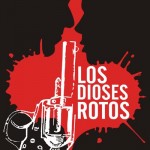 Literario. La película de hoy es Los dioses rotos.
Literario. La película de hoy es Los dioses rotos.
Laura (35 años) es una profesora universitaria que prepara su tesis de maestría sobre el famoso proxeneta cubano Alberto Yarini y Ponce de León,asesinado a balazos por sus rivales franceses que controlaban el negocio de la prostitución en La Habana de comienzos del siglo XX. Alberto y Sandra (24 años) nos hablan de una juventud signada por su entorno social. Ella, saliendo de la cárcel; él, de regreso de París en el albor de su carrera como gigoló.
Pero más allá de su anécdota, Los Dioses Rotos es una trama de valores enfrentados; una reflexión en torno a la perspectiva ética y moral de un grupo de personajes -de todos los niveles socioculturales- entre quienes los clichés de “positivos” y “negativos” no resultan sencillos de etiquetar. Drama social, suspense y melodrama comulgan en una historia interesada en resultar amena, universal y consecuente con la realidad a la que se debe.
Don´t forget your appointment with the best Cuban cinema today at 6pm at Café Literario. The movie for today is Los dioses rotos.
Laura (35 years) is a University professor preparing her master’s thesis on
the famous Cuban pimp Alberto Yarini y Ponce de León, gunned down by his French rivals, who controlled the prostitution business in Havana at the start of the 20th century. Alberto and Sandra (24 years) tell us of a youth marked by their
social environment. She, just out of jail; he, just back from Paris and starting
his career as a gigolo.
But beyond its anecdote, The Fallen Gods is a story of values confrontation; a reflexion around the ethical and moral perspective of a group of characters –from all social and cultural backgrounds- among who the “positive” and “negative” clichés are not easy to label. Social drama, suspense and melodrama together in a story aiming at being interesting, universal and consequent with its reality.
Proyección de cine | Film Screening: El Benny
Ayer inauguramos la exposición de carteles de cine cubano y esta tarde comenzamos un ciclo de cine con lo mejor del cine contemporáneo de Cuba. La proyección de hoy es El Benny. Te esperamos a las 18:00 en el Café Literario.
Recién llegado de México donde consolidó su carrera a finales de los años cuarenta, Benny Moré es el artista que a través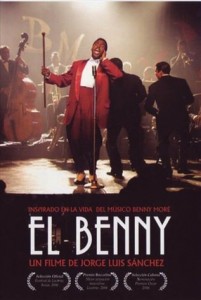 de la música y del baile hace delirar a las multitudes. El desgaste de la traición le hace fracasar en su empeño de armar la añorada banda de jazz. Frustrado y bajo los excesos de alcohol y sexo, su vida se caotiza. Con no poco esfuerzo vuelve a armar su banda y triunfa. Una venganza de viejos tiempos lo envuelve en un conflicto policial en Venezuela del que sale absuelto. Famoso y con dinero los desenfrenos de otros tiempos derivan en una severa crisis hepática que lo pone al borde de la muerte, prohibiéndole el médico definitivamente el alcohol. Contra todo pronóstico se recupera y reaparece en los principales cabarets y salones de Cuba. Una noche, en medio de un bailable, confiado por la aparente buena salud, viola la prohibición y se le acaba la vida como lo había soñado: cae sobre el escenario, delante de su público, que pasa del delirio a la consternación.
de la música y del baile hace delirar a las multitudes. El desgaste de la traición le hace fracasar en su empeño de armar la añorada banda de jazz. Frustrado y bajo los excesos de alcohol y sexo, su vida se caotiza. Con no poco esfuerzo vuelve a armar su banda y triunfa. Una venganza de viejos tiempos lo envuelve en un conflicto policial en Venezuela del que sale absuelto. Famoso y con dinero los desenfrenos de otros tiempos derivan en una severa crisis hepática que lo pone al borde de la muerte, prohibiéndole el médico definitivamente el alcohol. Contra todo pronóstico se recupera y reaparece en los principales cabarets y salones de Cuba. Una noche, en medio de un bailable, confiado por la aparente buena salud, viola la prohibición y se le acaba la vida como lo había soñado: cae sobre el escenario, delante de su público, que pasa del delirio a la consternación.
La proyección de esta película estará precedida de un cóctel inaugural cortesía de la Embajada de Cuba.
Yesterday we celebrated the opening of the Exhibition of Cuban Film Posters and this evening we start a film series with the very best of Cuban Contemporary Cinema. The screening for today is El Benny. We hope to see you today at 6pm at Café Literario.
Just back from Mexico, where he consolidated his career in the 40s, Benny Moré through music and dance turns the public delirious. Betrayed by some friends, fails to put together the jazz band of his dreams. Frustrated and under the effects of alcohol and sex, his life turns into chaos. He finally forms the band again and succeeds. Due to an old revenge he gets embroiled in a police conflict in Venezuela and is acquitted. Now famous and with money, the excesses of previous times provoked a serious hepatic crisis that nearly killed him. Doctors tell him he cannot drink alcohol ever again. Against all odds, he recovers and comes back into the main Cuban cabarets and saloons. One night, while performing, confident of his recovery, he breaks doctors’ orders against alcohol and ends his life the way had dreamed: he falls on the stage, in front of his public, which passed from delirium to consternation.
Cine | Film screening: Volver a empezar
Despedimos el ciclo de cine dedicado al director José Luis Garci con uno de los éxitos históricos del cine español: Volver a empezar. Para disfrutar de esta película en pantalla grande, pasa por nuestro Café Literario hoy a las 18:00.
Antonio Albajara (Antonio Ferrandis) es un exitoso poeta y profesor de la Universidad de Berkeley y reciente ganador de un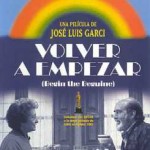 premio Nobel que vuelve a Gijón, su tierra natal. Vuelve buscando todo aquello que dejó en su juventud; allí se reencontrará con su pasado: su viejo amigo Roxiu (ambos jugaron en el equipo de fútbol del Sporting de Gijón años atrás) y su viejo amor, Elena (Encarna Paso). Con sus recuerdos, sus amigos y Elena, Antonio comenzará un viaje inolvidable para todos.
premio Nobel que vuelve a Gijón, su tierra natal. Vuelve buscando todo aquello que dejó en su juventud; allí se reencontrará con su pasado: su viejo amigo Roxiu (ambos jugaron en el equipo de fútbol del Sporting de Gijón años atrás) y su viejo amor, Elena (Encarna Paso). Con sus recuerdos, sus amigos y Elena, Antonio comenzará un viaje inolvidable para todos.
Ganadora del premio Oscar en la categoría de“Mejor película de habla no inglesa” en 1982.
Today is the last session of the José Luis Garci film series and we´ll show one of the biggest success of Spanish cinema: Volver a empezar. If you wish to enjoy this film on big screen, come to our Café Literario today at 6pm.
Antonio Albajara (Antonio Ferrandis), a successful poet and lecturer at Berkley University, recent Nobel Prize winner, comes back to his hometown Gijón in the north of Spain. He looks for what he had left behind in his youth and he is reunited with his old friend Roxiu (they used to play together in Gijón’s football team many years ago) and his first great love Elena (Encarna Paso). With his memories, his friends and Elena, he will set off for a journey which will prove unforgettable to all.
The film won the 1982 Academy Award for Best Foreign Language Film.
Cine | Film Screening: El abuelo
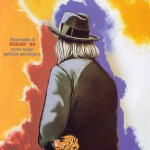 Continuamos con el ciclo de cine dedicado José Luis Garci con la proyección de una de sus peliculas más reconocidas: El abuelo. La puedes disfrutar hoy a las 18:00 horas en el Café Literario.
Continuamos con el ciclo de cine dedicado José Luis Garci con la proyección de una de sus peliculas más reconocidas: El abuelo. La puedes disfrutar hoy a las 18:00 horas en el Café Literario.
Don Rodrigo de Arista Potestad, Conde de Albrit (Fernando Fernán-Gómez), símbolo de una familia aristocrática, tras una larga estancia en América regresa a su pueblo dispuesto a desvelar un gran secreto. Pronto descubrirá el resentimiento de un pueblo desagradecido, el poder del honor de los Arista Potestad y el autentico valor de su verdadera familia.
Fernando Fernán Gómez ganador del premio Goya al “Mejor actor protagonista” en el año 1999.
Candidata a los Oscars a “Mejor película de habla no inglesa” en el año 1998.
We keep showing you the best of José Luis Garci´s cinema with the screening of one of his most remarkable films: El abuelo. You can enjoy today at 6pm at Café Literario.
Don Rodrigo de Arista-Potestad, the Heir of Albrit (Fernando Fernán-Gómez), the very symbol of an aristocratic family, returns to his town after a lengthy stay in America, ready to reveal a big secret. Soon he discovers the resentment of an ungrateful town, the power of the honour of the Arista-Potestad and the true bravery of his family.
The film was an Academy Award nominee as Best Foreign Language Film. Fernando Fernán-Gómez won Goya Award as Best Actor.
Cine | Film screening: You are the one
Te invitamos a que asistas esta tarde a la segunda sesión del ciclo de cine dedicado a José Luis Garci. Hoy a las 18:00 horas proyectamos You are the one en el Café Literario.
A finales de los años 40, Julia la hija de una acaudalada familia de Madrid, viaja hacia el pequeño pueblo asturiano de Cerralbos del Sella para recuperarse de una gran pérdida. Allí está la gran casona familiar – Llendelabarca- donde vivió los veranos más felices de su vida. Poco a poco la relación de Julia con los guardeses, con el maestro Don Orfeo e incluso con el desdichado cura del pueblo, Don Matías, hará que Julia empiece a recuperar las ganas de vivir de nuevo.
“Elegante drama rodado en blanco y negro y galardonado con 5 Premios Goya en el que Garci recupera el sabor del mejor cine sentimental americano” (Fernando Morales: Diario El País)
This evening we invite you to come to the second session of the Jose Luis Garci cinema series. You are the one will be screened today at 6m at Café Literario.
Towards the end of the 40′s, Julia, daughter of a wealthy family in Madrid, travels to the remote Asturian town of Cerralbos del Sella to get over a great loss. The family home -Llendelabarca- lies there and its where she spent the happiest summers of her life. Gradually, her relationship with the keepers, the schoolmaster Don Orfeo and also the unlucky priest of the town, Don Matías, will make Julia start to enjoy her new life to the full.
Exposición: Arpilleras poéticas | Exhibition: Poetic Arpilleras
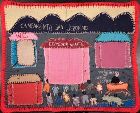 Mañana, día 22, inauguramos nueva exposición gracias a la colaboración de la Embajada de Chile en Irlanda y la Dirección de Asuntos Culturales del Ministerio de Relaciones Exteriores de Chile, los verdaderos motores de esta iniciativa.
Mañana, día 22, inauguramos nueva exposición gracias a la colaboración de la Embajada de Chile en Irlanda y la Dirección de Asuntos Culturales del Ministerio de Relaciones Exteriores de Chile, los verdaderos motores de esta iniciativa.
Arpilleras Poéticas comisariada por la académica y curadora chilena residente en Irlanda del Norte, Roberta Bacic, reúne alrededor de 30 arpilleras chilenas (técnica consistente en la utilización de piezas textiles gruesas y ásperas sobre cuya superficie se realizan trabajos de artesanía y bordado) de diversos tamaños que relatan la historia, la sociedad y la cultura del Chile reciente.
Roberta Bacic a lo largo de los años ha reunido una gran colección de dichas valiosas piezas, dedicándose desde comienzos del año 2000 a su recuperación, conservación y estudio. Ha expuesto a partir del 2008 en Nueva York, Hamburgo, Sao Paulo, Belfast, Barcelona, Berlín, Osaka, Kingston, Londres entre otras muchas ciudades y ahora en Dublín el público tendrá la oportunidad de disfrutar de este arte textil chileno que habla de las vicisitudes del hombre y la memoria.
Puedes visitar la exposición durante el siguiente horario:
Lunes a jueves: 2-7pm. Sábados: 10am a 2pm. Cerrados los viernes, domingos y Bank holidays.
From November 22th to December 15th, the Cervantes Institute, the Embassy of Chile in Ireland and the Cultural Affairs Committee of the Ministry of Foreign Affairs of Chile have the honour to invite you and your family to enjoy the Poetic Arpilleras exhibition of the Chilean academic and curator resident in Northern Ireland, Roberta Bacic. The exhibition will open at 6pm on November 22nd with the curator Roberta Bacic and a poetry recital by Chilean poet Jaime Huenún.
The exhibition “Poetic Arpilleras” gathers around 30 Chilean “arpilleras” (the technique consists scraps of materials hand sewn and appliqued onto burlap. Often arpillera dolls are used to add the three dimensional perspective. Wool is used to sew around the piece, either with a needle or crochet, to give it the shape of a picture to be hung on a wall) of various sizes. These tell about the history, society and culture of contemporary Chile.
Roberta Bacic has gathered throughout many years a vast collection of these valuable pieces devoting time to acquire, recover, conserve and study them since the early 2000’s. She has exhibited from 2008 in New York, Hamburg, Sao Paulo, Belfast, Barcelona, Berlin, Osaka, Kingston and London among many other cities. Now in Dublin, the general public will have the opportunity to enjoy this Chilean textile art which tells the story of human experience and memory.
The exhibition is open during these times:
Mon-Thurs.: 2-7 pm. Sat: 10 am-2 pm h.
Closed Frid., Sun. and Bank holidays
Film screening | Cine: Las acacias
Todavía estás a tiempo de disfrutar del estupendo ciclo del cine argentino más actual. La película de hoy es Las acacias y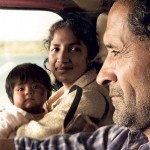 se proyectará a las seis en el Café Literario.
se proyectará a las seis en el Café Literario.
La ruta que une Asunción de Paraguay con Buenos Aires. Un encargo: camionero debe llevar a una mujer desconocida. La mujer no llega sola, trae una niña en brazos. 1.500 kilómetros de viaje por delante.
La ópera prima de Pablo Giorgelli (…) presenta un conflicto menor que progresa a medida que los minutos transcurren, para terminar convirtiendo una historia mínima en una lección del más puro cine (en Escribiendo Cine).
Película ganadora de la Cámara de Oro en el último Festival de Cannes y premiada en San Sebastián, Londres, Biarritz y Bratislava, entre otros.
You can still enjoy the best of Argentinian cinema thanks to the film series that we show in October. The film that will be shown today is Las Acacias. The screening will be at 6pm at Cafe Literario.
Rubén is a lonely truck driver who has been covering for years the motorway from Asunción del Paraguay to Buenos Aires, carrying wood. However, today’s journey will be different. This morning, in a motorway stop near Asunción, Jacinta shows up an hour later to begin a journey by track which is going to take her to Buenos Aires. What’s more, Rubén finds out at that very moment that little Anahí, who’s 8 months old, will travel with them- It is not the best beginning. As kilometres go by, the relationship between Rubén and Jacinta will grow. They will slowly meet and sip into each other’s soul. None of them talks much about their lives. None asks much either. It’s a few word journey but it is not a silent one.
Awarded the Golden Camera at the Cannes Film Festival and other prizes in San Sebastián, London, Biarritz and Bratislava, just to mention a few.
Taller: El aceite de oliva: cultura, ciencia y gastronomía / Workshop: Olive oil: culture, science and cuisine
 ¿Sabías que en 2010 la UNESCO declaró la dieta mediterránea patrimonio inmaterial de la humanidad? ¿Y cuál es uno de sus ingredientes esenciales? El aceite de oliva.
¿Sabías que en 2010 la UNESCO declaró la dieta mediterránea patrimonio inmaterial de la humanidad? ¿Y cuál es uno de sus ingredientes esenciales? El aceite de oliva.
Si tienes tu reserva, ven hoy a las seis a disfrutar de este taller-cata organizado por el Instituto Cervantes para todo tipo de público. En él podrás aprender más sobre su producción, sus características, sus propiedades gastronómicas, sus beneficios para la salud o los últimos avances científicos con los que está relacionado, además de probar tres diferentes clases de aceite de oliva.
Desde la antigüedad, el aceite de oliva u “oro líquido”, como lo llamaba Homero, ha estado presente en la vida del ser humano y a lo largo de la historia no se ha empleado únicamente como condimento que enriquece los alimentos sino que también ha tenido usos medicinales, religiosos, cosméticos o industriales.
Las últimas investigaciones científicas relativas a la salud nos dicen que son los aceites con mayores niveles de grasas mono-insaturadas y que el consumo de dos cucharadas diarias reduce el riesgo de padecer enfermedades cardiovasculares. Además son ricos en antioxidantes y tiene otros muchos efectos beneficiosos sobre la salud.
SRC: reservas.dublin@cervantes.es
Este taller forma parte de Innovation Dublin 2012, que se celebra en Dublín del 15 al 26 de octubre. El festival demuestra la capacidad de Dublín de inspirar, interactuar e innovar.
Did you know that UNESCO declared Mediterranean diet as intangible cultural heritage in 2010? And what is one of its essential ingredients? Olive oil.
If you have a reservation, come today at 6pm and enjoy this tasting workshop organized by the Cervantes Institute for all types of people. Here you can learn more about its production, characteristics, culinary properties, health benefits or the latest scientific advances related to it, as well as taste the three different types of olive oil.
Since ancien times, olive oil or “the golden liquid”, as Homer called it, has been present in human lives and has not only served as seasoning to enrich food but has also had medicinal, religious, cosmetic and industrial uses.
The latest health related scientific research has shown that these oils have the highest levels of monounsaturated fats and that the consumption of two daily spoonfuls reduces the risk of cardiovascular diseases. In addition to that, they are rich in antioxidants and have many more beneficial effects on health.
RSVP: reservas.dublin@cervantes.es
This workshop is part of Innovation Dublin 2012, which takes place across Dublin from Oct 15th -26th. The festival demonstrates Dublin’s capacity to inspire, interact and innovate.
Cine / Film screening: El mural
La segunda sesión del ciclo de cine argentino llega hoy a las seis al Café Literario con la proyección de la película El mural.
La trama desarrolla su acción en los años treinta, cuando llega al país David Alfaro Siqueiros. El film relata las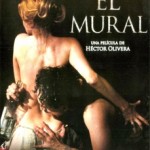 distintas circunstancias que llevaron al pintor a realizar el famoso mural en la quinta Los Granados, propiedad de Natalio Botana, con la colaboración de los pintores argentinos Lino Enea Spilimbergo, Antonio Berni y Juan Carlos Castagnino y el uruguayo Enrique Lázaro; más las complicadas y entrecruzadas relaciones entabladas entre los personajes protagonistas de la historia.
distintas circunstancias que llevaron al pintor a realizar el famoso mural en la quinta Los Granados, propiedad de Natalio Botana, con la colaboración de los pintores argentinos Lino Enea Spilimbergo, Antonio Berni y Juan Carlos Castagnino y el uruguayo Enrique Lázaro; más las complicadas y entrecruzadas relaciones entabladas entre los personajes protagonistas de la historia.
Película ganadora de cinco Premios Sur 2010: Mejor Fotografía, Mejor Montaje, Mejor Dirección artística, Mejor Diseño de vestuario y Mejor Maquillaje y Caracterización.
The second session of the Argentinian film series will be held today at 6pm at Cafe Literario with the screening of El mural.
The plot takes place in the 30s, when David Alfaro Siqueiros arrived to the country. The film relates the several circumstances leading the artist to paint the famous mural in Los Granados, the country estate of Natalio Botana, with the collaboration of Argentinean painters Lino Enea Spilimbergo, Antonio Berni and Juan Carlos Castagnino, and the Uruguayan Enrique Lázaro. The story reveals the complicated criss-cross relations among the main characters.
Awarded five Premios Sur 2010: Best Photography, Best Editing, Best Art Direction, Best Costume Design, Best Makeup and Portrayal.
Cine / Film screening: El hombre de al lado / The man next door
Comenzamos un nuevo ciclo de cine con algunas de las mejores películas de la cinematografía argentina de los últimos años. Te esperamos hoy a las seis en el Café Literario.
El hombre de al lado narra un conflicto entre vecinos que parece no tener fin. Una simple pared medianera puede dividir dos mundos, dos maneras de vestir, de comer, de vivir. De un lado Leonardo (Rafael Spregelburd), fino y prestigioso diseñador que vive en una casa realizada por Le Corbusier. Del otro lado Víctor (Daniel Aráoz), vendedor de autos usados, vulgar, rústico y avasallador. Víctor decide hacer una ventana para tener más luz, y ahí empieza el problema: cada uno toma conciencia de la existencia del otro.
Película seleccionada para los Premios Goya como Mejor película extranjera de habla hispana.
We start a new cinema series today with the screening of some of the best and most recent Argentinian films. The first film will be shown today at 6pm at Café Literario.
A small incident over two neighbours common wall sparks a conflict which affects the intimacy of the view over the chimney; the protagonist sparks a conflict and with paranoiac obsession destroys everyday life.
In the Argentine black comedy The Man Next Door privacy becomes an issue for the main character, Leonardo, whose home happens to be the Curutchet house inLa Plata, Argentina, which was designed by Le Corbusier in 1949.
Living in a design icon certainly has its drawbacks. It’s bad enough that Leonardo has to deal with pushy tourists who constantly ask for tours, but then his neighbor Victor attempts — without Leonardo’s permission — to build a window in a dividing wall between the two houses, to get more sunlight. The window, to Leonardo’s horror, would allow the rather boorish Victor to see all the intimate details of Leonardo’s family’s life.
Goya Awards nomination for best Spanish Language Foreign Film.
